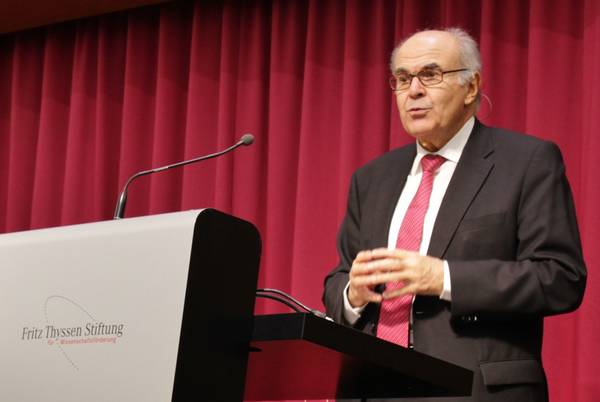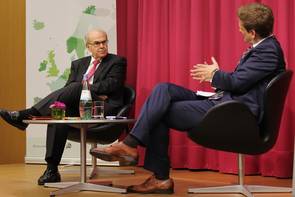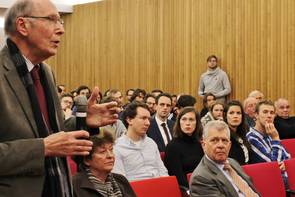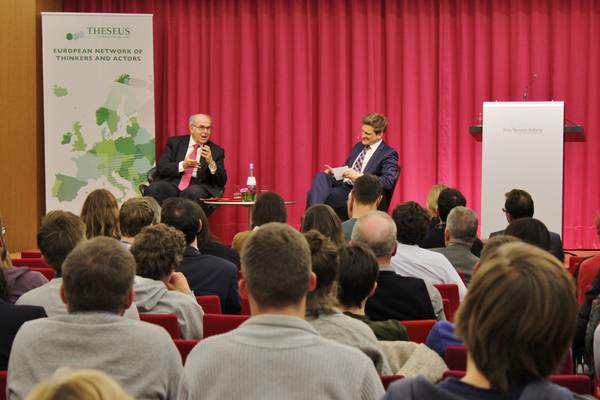

THESEUS Public Lecture with Prof Vassilios Skouris
"Die Europäische Union als Rechts- und Wertegemeinschaft?"
On 19 November 2015, former President of the European Court of Justice (ECJ) Prof. Dr. Dr. h.c. Vassilios Skouris discussed the judicial and normative character of the European Union (EU) at the Fritz Thyssen Foundation in Cologne. Recent internal EU developments such as the refugee movement have given this topic particular relevance.

Why do EU member states close their borders in front of people fleeing from war? Is this compatible with EU values? What are those exactly and why is it essential to support them?
"Yes, it is worthwhile to support EU values", stated former President of the ECJ Prof. Dr. Dr. h.c. Vassilios Skouris at several points in his speech on 19 November 2015 at the Fritz Thyssen Foundation in Cologne. "And it is important to remind oneself of these values from time to time." Skouris referred to the Treaty of the European Union (TEU) and the Charter of Fundamental Rights to quote some of the most central parts on the EU's judicial and normative fundaments. Among them are principles such as respect for human dignity, freedom, equality, respect for human rights and rule of law.
"There is hardly any higher achievement than rule of law", stressed the EU law expert. The refugee movement towards the EU demonstrated the high value of this good. Skouris recognized challenges connected to handling the refugee movement and expressed his disappointment regarding the fact that times of crises tend to reveal a lack of common interpretation of the EU’s laws and values among EU member states. "The right of free movement is such a high good that we should not risk by starting to close borders again."


This being said, Skouris did not dive further into a normative discussion on 'right or wrong' of singular political actions concerning the refugee crisis. Instead, he put forward his view on the general tasks of the ECJ, which is to interpret EU law. He addressed typical criticism of the ECJ, arguing that from time to time the ECJ not only interpreted EU law, but shaped it. Skouris claimed: "Our task is to get clarity on EU law – if policy-makers adopt clear and indisputable laws, we do not have much interpretation work. If they do not, we need to make a decision." Instead of criticising the court, one should step in for policy-makers adopting clear EU law, said Skouris.
Following the heavy and complex topics of the evening, Skouris ended with a seemingly soothing statement combining his belief in the European project with his lecture in Cologne: "For me 'European' means that – despite not agreeing in every detail – we can sit together and discuss peacefully, because in the end we share common values."

The THESEUS public lecture was introduced by Dr. Frank Suder, Fritz Thyssen Foundation, and Prof. Wolfgang Wessels, University of Cologne. Suder illustrated the complexity of the upcoming discussion by explaining: "This summer, we considered the Greek crisis as the central crisis, now it vanished in the background due to the 'more severe' refugee crisis, although only having been seemingly resolved." He added: "The EU project has often been considered to be an elite project, not one of a wider public. In challenging times like this, that can become a fundamental problem for the Union." Wessels stressed the need of the European Court of Justice (ECJ) as important referee in times of crises as well as day-to-day EU politics – often on behalf of the citizens as in the rulings on data protection or anti-discrimination. The evening was moderated by Dr Lysander Fremuth, University of Cologne.
The speaker
Prof. Dr. Dr. h.c. Vassilios Skouris is former President of the European Court of Justice (2003-2015). His career began after his studies and dissertation in Law at the Universities of Berlin and Hamburg. Adding to further professional experiences, he held a professorship at the University of his hometown Thessaloniki, served twice as Minister of Interior and worked as Director of the Centre of International and European Economic Law (CIEEL). In 1999, Skouris was nominated Judge of the European Court of Justice (ECJ) and in 2003 its President.